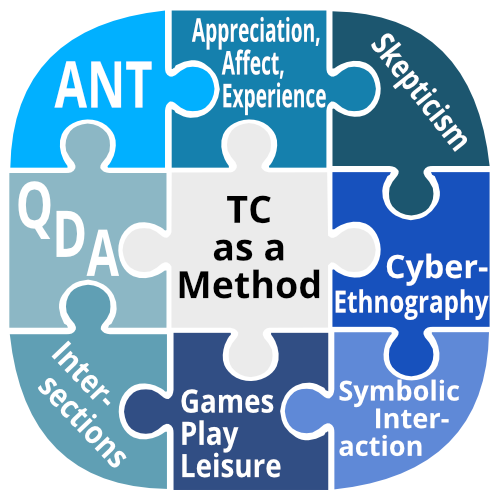Academic Staff

Position
Junior Associate Professor
Program Coordinator (Focus Advisor VMC)
Joint Steering Committee Speaker
Contact Information
kamm.bjornole.7e[at]kyoto-u.ac.jp
(replies on Wed & Thu)
+81 750 753 2462
Kyoto University
Graduate School of Letters
Yoshida honmachi, Sakyō-ku
Kyoto 606-8501
Room: Faculty of Arts Build. [7], 2nd floor, room L203
Wed 11:00-12:00 by appointment (on location or online).
Björn-Ole KAMM coordinates the program at Kyoto University and teaches foundational theories and approaches of a transcultural perspective. For the fiscal years 2022 and 2023, he served as the Speaker of the Joint Steering Committee. His personal background is in Japanese Studies with an emphasis on media psychology, co-creative practices, and qualitative methods.
Note to Research Students (研究生): I cannot serve as your supervisor (see here). Please go through the AAO for support and inquiries.
Dr. phil. in Japanese Studies, Heidelberg University
Magister (M.A.) in Japanese Studies and Communication & Media Studies, Leipzig University
Cultural Ordering, Cyber-Ethnography, Educational Role-Playing, Media Psychology (Uses & Gratifications)
Co-creation, cultural mediation, live-action role-play (larp), performativity, relational materialism, transculturality, trans-gender
My previous work concerned media and cultural psychological approaches, concentrating on the uses and gratifications of Japanese and German users of the so-called boys’ love genre. Subsequently, I focused on the dynamics of inclusion and exclusion, affect and subject formation in networked communities of interest, the agency of stereotypes, and of cultural mediators within the transcultural sphere of role-playing games. Currently, my research deals with learning effects and how live-action role-playing can be employed not only for therapeutic means but also for the presentation of research results.
This research builds on the expertise I gained in Japanese Studies but seeks to overcome the “nation-state default mode” of studying culture, which has brought me to the interdisciplinary field of transculturality. The transregional outlook of this approach is based on the perspective that cultures are not contained within homogenous and territorially bounded spheres but that they are constituted through transformations and entanglements. Transculturality informs not only my research but also my teaching: Students will learn to unpack established concepts and are geared towards empirical studies of cultural processes.
For further info, see also my personal website: www.b-ok.de
2017 – Present
Junior Associate Professor, Graduate School of Letters, Kyoto University
2015 – 2017
Program-specific Senior Lecturer, Center for the Promotion of Interdisciplinarity in Education and Research (CPIER)/Graduate School of Letters, Kyoto University
2013 – 2015
Graduate Program Lecturer, Cluster “Asia & Europe in a Global Context,” Heidelberg University
2012 – 2013
Research Fellow, GCOE “Reconstruction of the Intimate and Public Spheres,” Kyoto University
2011 – 2012
Research Area Coordinator, Cluster “Asia & Europe in a Global Context,” Heidelberg University
A complete list of publications can be accessed here.
[1] Kamm, B-O. 2023. reLarp. Debriefing and visualisation tool in R. https://github.com/larpGit/relarp
[2] Kamm, B-O. 2022. “Reenacting Japan’s Past That Never Was: The Ninja in Tourism and Larp.” In Reenactment Case Studies: Global Perspectives on Experiential History, edited by Vanessa Agnew, Juliane Tomann, and Sabine Stach, 146–70. New York: Routledge. doi:10.4324/9780429445668-10.
[3] Kamm, B-O. 2020. Role-Playing Games of Japan – Transcultural Dynamics and Orderings. New York: Palgrave.
[4] Kamm, B-O. 2019. “A Short History of Table-Talk and Live-Action Role-Playing in Japan: Replays and the Horror Genre as Drivers of Popularity.” Simulation & Gaming 50 (5): 621-44. doi:10.1177/1046878119879738.
[5] Kamm, B-O. 2019. “Live-Action Role-Play (Larp) as a Serious Gaming Tool for Awareness Raising: The Case of hikikomori (Acute Social Withdrawal)” [in Japanese]. Japanese Journal of Occupational Science 13 (1): 32-44. doi:10.32191/jjos.13.1_32.
[6] Kamm, B-O. 2019. “Adapting Live-Action Role-Play in Japan: How ‘German’ Roots Do Not Destine ‘Japanese’ Routes.” Replaying Japan 1, pp. 64-78. http://hdl.handle.net/10367/11682.
[7] Kamm, B-O. 2017. “Translating Research into Larp: Village, Shelter, Comfort.” In Rafael Bienia, Gerke Schlickmann, LARP: Silberhochzeit. Braunschweig, Zauberfeder, pp. 31-60.
See also TEDxKyoto Talk in 2017.
[8] Kamm, B-O. 2017. “Brokers of ‘Japaneseness:’ Bringing Table-Top J-RPGs to the ‘West’.” Mutual Images Journal, vol. 2., pp. 44-81. http://www.mutualimages-journal.org/index.php/MI/article/view/5
[9] Kamm, B-O 2016. “Cross-Gender Table-Talk-RPG auf Japanisch; oder, die beiläufigen Realitäten des Tischrollenspiels” [Cross-Gender Table-Talk-RPG in Japanese; or, the Collateral Realities of Table-Top Roleplaying]. In Japanische Populärkultur und Gender, edited by M. Mae, E. Scherer, and K. Hülsmann, 273–303. Wiesbaden: VS.
[10] Galbraith, P., Kam, T. H., Kamm, B.-O. (eds.) 2015. Debating Otaku in Contemporary Japan: Historical Perspectives and New Horizons (SOAS Studies in Modern and Contemporary Japan). London: Bloomsbury Academic.
[11] Kamm, B.-O. 2013. “’Rotten’ Use Patterns: What Entertainment Theories Can Do for the Study of Boys’ Love.” In “Transnational Boys’ Love Fan Studies,” edited by K. Nagaike and K. Suganuma, special issue, Transformative Works and Cultures, no. 12. doi:10.3983/twc.2013.0427.
[12] Kamm, B.-O. 2010. Nutzen und Gratifikationen bei Boys’ Love Manga – Fujoshi oder verdorbene Mädchen in Japan und Deutschland [Uses and Gratifications of Boys‘ Love Manga – Fujoshi or rotten girls in Japan and Germany]. Hamburg: Kovac.
The following information is neither exclusive nor comprehensive but covers suggestions and ideas for topics I am interested in supervising.
Possible areas of supervision (VMC)
- Embodying fiction, becoming “other”
- Gratifications of retro-gaming and analog gaming
- Haptics of the digital: Feeling web-manga
- LGBTQIA+ and gaming
- Media aesthetics/appreciation, media phenomenology: flow, transportation
- Parasocial interaction and relationships
- Translocal communities of practice
Possible areas of supervision (SEG)
- Absolutism of currency: from cash only to PayPay supreme
- Digital health, gamification of health care
- Four seasons and other myths of Japanese education
- Generation gaps: Conservative/reactionary youth vs. cosmopolitan pensioners
- Logic of traffic in Japan and Asia
- Male gatekeeping and entitlement: From rigged entrance exams to rape clubs
- Mental health in Japan: Stereotypes vs. care
- Online hate, private platforms, and the state
- Smart dependence: Blessing or children’s 1984?
- Sex work in Japan (institutions)
Insights and skills to expect from my teaching and supervision
Teaching and Supervision
Please click the puzzle pieces to learn more!

Relational Materialism
Also known as Actor-Network Theory. One point made by proponents of relational materialism (Law 1994) makes us aware of how the social is generated whenever actors practically connect entities with other entities, that power always needs other materials than just human bodies to travel (Latour 2005). Despite the "theory" in the name, ANT and relational materialism rather designate perspective, a methodology. Power and scale are effects of network configurations — and these networks are not out there but gathering devices for us researchers.
Qualitative Data Analysis
Employing respective software, QDA helps us deal with large amounts of data to unearth connections and build theories from the ground up. Following ideas of multi-modal and multi-media discourse analysis, QDA software works with written text, images, and audio-visual material.
Skepticism
I know that I know nothing. So, I do not even know that I know nothing, and thus, may know something (or, "suspension of judgment," Wittgensteinian Pyrrhonism). Question things taken for granted and follow every lead, describe before you judge and conclude. Be an ant (cf. relational materialism).
Cyber-Ethnography
Cyber-ethnography takes seriously that humans are cyborgs (Donna Haraway), hybrids that form heterogeneous networks of bodily, semiotic, and technological elements. Cyber-ethnography now builds on the resulting ethical implications (online persona cannot be separated from offline individuals) and studies online communication together with connected offline situations. Offline conversations are triangulated with online interactions to draw a more holistic, life-world sensitive picture, not to play both sides against each other in a search for “authenticity.” Research encounters on- and offline are performative and should be analyzed as such. They do not point to “hidden truths” out there nor in the minds of people.
Intersectionality
Intersectionality looks at multiple systems of oppression and asks researchers to be conscious of their own positionality (Nash 2011). Emerging out of discussions of how racism, sexism, and economic disadvantage systematically reinforce each other, intersectionality helps us understand how it is not just genderd divisions or not just growth-addicted markets that produce marginality and exclusion. Considering mental health in Japan, phenomena such as hikikomori or instances of neuro-diversity appear mostly male inscribed — offering support to male-identified persons only. Women fall to the wayside and become doubly marginalized. Intersectionality asks us to untangle these networks of disempowerment.
Ludology and Game Studies
The rush into ludology (games as systems, the study of games on their own terms) and game studies (social, cultural, philosophical, and other aspects of gaming) continues. With the economic success of digital gaming, most of the research related to games and play focuses on video, computer, and online games – a situation referred to by a number of scholars as a “digital fallacy,” where non-digital forms of playing fall by the wayside (Stenros & Waern 2011). Understanding games as an activity and play as a frame of mind (Apter 1991), the study of analog games (board and card games, tabletop role-playing, larp) offers insights beyond what developers came up with. What do we do when we play?
Symbolic Interactionism
Ideas of symbolic interactionism (Blumer 1969) form the first point of departure for my research and teaching, i.e., the perspective that people do not interact directly with things and other people but with the meanings these things and people hold for them. Experiences change these meanings so that the self, motivations, gender, and emotions become less mental entities than products of interaction (Harré 1992).
Appreciation, Affect, Experience
A variety of theories and approaches seek to understand why humans watch the movies they do, what sensations we gain from playing horror RPGs, how it feels to be sad as a fictional character and cry in a corner — only to cherish this feeling afterward. Media use research has moved on from Hollywood's hedonistic principle to media appreciation: The varied affective and cognitive responses and gratifications resulting from meaningful media exposure. Similarly, live-action role-play and cosplay studies investigate bleed and the gratifications gained from embodying someone else. Many borrow from affect theory but most importantly, emphasize the primary experience of researchers themselves. Transportation or flow (Csikszentmihalyi) offer interesting perspectives to study these experiences.
Methodological Transculturality
We can speak of open transculturality, such as Mexican fusion sushi, or look for hidden transculturality as in modern yoga's connection to European contortionist practices and ideas of a modern, healthy body. Methodological transculturality (cf. Monica Juneja, Axel Michaels) now is the critical but fun part. This outlook posits that there is nothing substantially novel (nor particularly "Western") about "globalization," that human lifeworlds and their cultural shapes are not partitioned along territorial boundaries of nation-states, and that subsequently, existing forms of obtaining and organizing knowledge are ill-suited for coming to grips with the above points (cf. David Mervart). Transculturality is a field constituted relationally, so that equivalence and difference, asymmetry and power, are effects brought forth by regimes of circulation and networks of exchange. To investigate the dynamics of cultural forms and formations means to be empirical and pay attention to the particularity of situations and the agency of actors. Thus, there should be no a priori assumptions before a study begins and explanations cannot take recourse in standard narratives of influence.
Spring Term
Introduction to Transcultural Studies (KBR/SEG/VMC).
Basic Research Skills (KBR/SEG/VMC).
Play, Transcultural: Interdisciplinary Game Studies 101 (VMC).
Japanese Contemporary Popular Culture: Media Practices in a Global Context (VMC). [until 2022]
Fall Term
Decisions, Orderings, and the Nation: Japan at Play (KBR/SEG).
Actors, Processes, and Networks: Studying (Sub-) Cultural Practices (SEG/VMC).
Heidelberg-Strasbourg Student Workshop.

